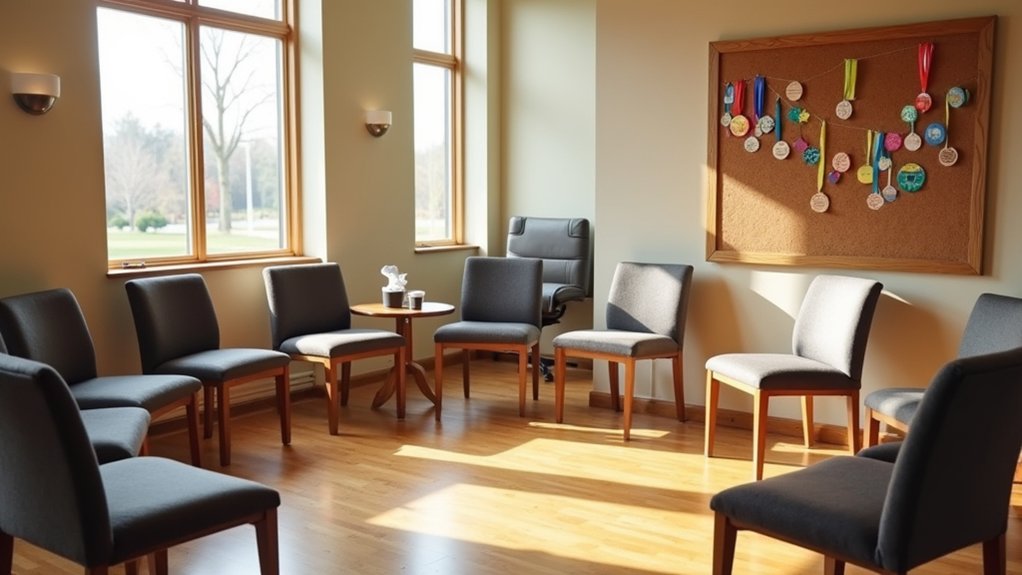Peer support will greatly boost your chances of lasting recovery, with regular group engagement reducing relapse risks by up to 35%. You’ll find the most success by attending 5+ weekly meetings, connecting with recovery coaches, and building diverse support networks through programs like AA or NA. Research shows that active participation in peer communities can lower relapse rates to just 4-8% per semester. Understanding these proven strategies will help transform your recovery journey from isolated struggle to collective healing.
Understanding the Power of Peer-Based Recovery Programs

While traditional addiction treatment approaches remain valuable, peer-based recovery programs have emerged as a powerful complement that consistently demonstrates remarkable outcomes. When you engage with peer support, you’re tapping into a proven system that reduces substance use and cuts relapse rates to as low as 4-8% per semester. Recovery community centers provide crucial services and have shown to improve quality of life for participants.
The secret lies in the unique connection you’ll form with peer coaches who’ve walked your path. Their lived experience creates authentic bonds that boost your emotional resilience and peer motivation. You’ll benefit from dedicated emotional support, with peers spending nearly half their time providing empathetic listening and encouragement. They’ll also connect you to essential resources, help you navigate treatment options, and share practical recovery strategies. Research shows that active engagement in peer support groups is a strong predictor of sustained recovery success. With state-level certification held by 67% of peer workers, you can trust in the professional qualifications of your support team. This thorough support system greatly improves your chances of maintaining long-term sobriety and stability.
Building Strong Support Networks Through Group Engagement
Building on the proven impact of peer support, group engagement offers a powerful pathway to strengthen your recovery network and maintain sobriety. Studies show that attending 5+ weekly meetings can boost your one-year abstinence rate to 61.1%, while peer engagement markedly reduces relapse risks by 35% compared to traditional treatments alone. These support networks are particularly effective since approximately 50% to 75% of individuals achieve recovery without formal treatment intervention. Members benefit from safe environments where they can openly share struggles and develop essential coping strategies. The programs emphasize personal growth through sharing experiences and supporting others on their recovery journey.
| Group Benefits | Engagement Level | Success Metrics |
|---|---|---|
| Social Support | 2-4 meetings/week | 42.7% abstinence |
| Skill Building | 5+ meetings/week | 61.1% abstinence |
| Peer Connection | 90 in 90 days | Highest retention |
You’ll find that active participation in group dynamics enhances your coping skills, builds self-efficacy, and creates lasting social bonds. Whether through 12-step programs, SMART Recovery, or other peer-based formats, consistent group involvement provides the structured support essential for long-term recovery success.
Maximizing the Benefits of Recovery Coaching

To maximize recovery coaching’s benefits, you’ll need to establish authentic relationships with your coach through open communication and shared experiences that build mutual trust. Research shows that 120 minutes represents the typical coaching interaction time needed to develop this foundational connection. Your recovery coach can help you create structured action plans that align with your personal goals while incorporating proven strategies for maintaining sobriety. As you face early recovery challenges, your coach’s lived experience and non-judgmental support will guide you through difficult changes while connecting you to valuable community resources and healthcare services. Working from a strengths-based approach, your coach will help identify and leverage your unique assets to build lasting positive changes in your life.
Building Trust Through Authenticity
Since authentic relationships form the cornerstone of successful recovery coaching, establishing genuine trust between coaches and clients becomes paramount for achieving lasting sobriety. Through trust building exercises and authentic communication, you’ll create a foundation for honest dialogue about your struggles and goals. Professional helpers demonstrating unexpected acts kindness can deeply impact the recovery journey and strengthen the therapeutic alliance.
When you’re transparent about your experiences, you enable your recovery coach to provide more targeted support and earlier intervention when needed. Your willingness to share openly helps combat feelings of shame and isolation while strengthening your support network. Social support networks significantly reduce the likelihood of relapse during recovery. Engaging in honest self-expression stimulates neural circuits that promote positive emotional regulation and healing. By maintaining consistent contact with your coach and embracing accountability, you’ll develop the emotional resilience necessary for long-term recovery. Remember that your coach’s demonstrated reliability and non-judgmental approach create a safe space where you can explore your challenges and celebrate your progress authentically.
Structuring Recovery Action Plans
Structuring an effective recovery action plan creates the framework for your journey toward lasting sobriety. Through evidence-based goal setting, you’ll establish clear, measurable milestones that align with your personal strengths and recovery path. Incorporating accountability strategies, such as regular check-ins and progress tracking, can boost your abstinence success rates by up to 82%. Working with peer recovery coaches, who have lived experience in substance use recovery, adds a powerful dimension of understanding and relatability to your support system.
Your plan will connect you with crucial community resources and peer support networks, while helping you develop essential coping mechanisms for managing triggers and stress. You’ll learn practical skills for handling financial, legal, and interpersonal challenges that often arise in early recovery. Trauma-informed addiction therapy can be integrated into your recovery plan to address underlying issues. Remember, your action plan isn’t static – it’s designed to flex and adapt as your needs change, ensuring you’re always working with strategies that resonate with your current circumstances and goals.
Navigating Early Recovery Challenges
Even with a well-structured action plan, the early stages of recovery present unique challenges that can test your resolve. You’ll likely face intense cravings, particularly in the first months, when relapse risks are highest. Research shows that 40-60% relapse within the first month after treatment. Exposure to familiar triggers and managing 16-18 hours of newfound daily time require strategic cravings management and consistent support. Studies indicate that engaging in leisure exploration interventions can significantly support recovery by helping individuals discover enjoyable activities and interests.
Emotional regulation becomes vital as you navigate stress, shame, and anxiety, feelings that you may have previously masked with substances. With over half of individuals experiencing co-occurring mental health conditions, it’s important to develop healthy coping mechanisms. Assertive Continuing Care approaches have demonstrated a higher success rate with 57% of participants maintaining sobriety after one year. Your recovery coach can teach you practical techniques like mindfulness and stress management while helping you build structured routines and meaningful activities. This thorough approach addresses both immediate challenges and long-term stability in your recovery journey.
Developing Lasting Connections in Mutual Aid Communities

While the journey of addiction recovery often begins as a personal endeavor, mutual aid communities play an essential role in transforming individual efforts into lasting, collective healing. You’ll find that effective connection strategies within mutual aid groups can greatly reshape your social network and strengthen your recovery capital.
Research shows that active participation in these communities provides you with valuable resources, from emotional support to practical coping skills. You’ll connect with peers who share similar experiences, creating a sense of belonging and understanding that’s difficult to find elsewhere. These connections span diverse backgrounds, with inclusive environments welcoming participants from all walks of life. Through regular meetings, substance-free activities, and opportunities to help others, you’ll build meaningful relationships that support your long-term recovery journey.
Leveraging Social Capital for Long-Term Sobriety
You’ll find that building a diverse recovery support network greatly enhances your chances of maintaining long-term sobriety through the combined power of bonding, bridging, and linking social capital. Your closest relationships provide essential emotional support and understanding, while connections to broader community groups offer new opportunities and resources for sustained recovery. By actively engaging with both personal networks and formal support systems, you’re strengthening multiple layers of social capital that serve as protective factors against relapse.
Building Recovery Support Networks
Building a strong recovery support network stands as one of the most essential factors in achieving lasting sobriety. You’ll find that network diversity plays a crucial role, as research shows individuals who engage with multiple support channels, from peer groups to community organizations achieve better outcomes. Evidence demonstrates that peer support groups can markedly reduce relapse rates while improving your self-efficacy and treatment adherence.
Your engagement strategies should include connecting with established recovery communities like AA or NA, which serve millions of people annually. These groups offer proven pathways to recovery, with data showing that over 72% of individuals who’ve struggled with substance use find success through such support systems. By actively participating in these networks, you’ll gain access to mentors and peers who can help reinforce your coping skills and sustain your recovery journey.
Strengthening Community Connection Bonds
Strong social capital serves as a cornerstone of lasting recovery, operating through three distinct but interconnected channels: bonding, bridging, and linking connections. You’ll find that deepening community engagement strengthens your recovery foundation, while diversifying social connections reduces isolation risks. By actively participating in support networks and community organizations, you’re building protective factors against relapse while accessing essential resources for sustained sobriety.
- Nurture family bonds and close relationships to establish stable emotional support
- Join social clubs, volunteer groups, or faith-based organizations to expand your support network
- Engage with workplace connections to develop professional skills and stability
- Connect with community organizations that can help you navigate healthcare, housing, and legal services
These structured social connections create a robust support system that greatly enhances your chances of maintaining long-term recovery success.
Overcoming Barriers With Peer-Guided Support
While traditional addiction treatment provides essential clinical support, peer-guided programs offer unique advantages in overcoming common barriers to recovery. You’ll find that peers help navigate systemic barriers by assisting with practical challenges like transportation, appointment scheduling, and healthcare system complexities. Their firsthand experience proves invaluable in connecting you to crucial resources and support networks.
Through peer empowerment, you’re more likely to stay engaged in treatment and complete detoxification programs. Peers offer immediate support during high-risk moments and provide realistic coping strategies based on lived experience. They’ll help you manage logistics, overcome healthcare obstacles, and maintain accountability throughout your recovery journey. This guidance is particularly effective if you’ve struggled with recurring relapse or have involvement in the criminal justice system.
Strengthening Recovery Through Shared Experiences
Through shared experiences in peer support groups, you’ll discover powerful opportunities for lasting recovery and personal transformation. Research shows that engaging in shared narratives and collective resilience markedly reduces relapse risks by 35% compared to other treatments. The supportive environment fostered through group connections helps you navigate challenges while building lasting emotional bonds and coping strategies.
- Connect with peers who understand your journey, decreasing stigma and creating a safe space for open expression
- Gain practical knowledge from others’ lived experiences, including relapse prevention and resource navigation
- Develop stronger recovery maintenance through ongoing encouragement and real-world coping skills
- Experience personal growth through storytelling and shared transformation, leading to increased appreciation of life and inner strength
These evidence-based benefits demonstrate why peer support serves as a cornerstone for sustained recovery success.
Frequently Asked Questions
How Do I Maintain Boundaries With Peers While Still Being Supportive?
You can maintain strong boundaries while being supportive by clearly communicating your role and limitations from the start. Practice supportive communication by actively listening and sharing relevant experiences without giving direct advice. Set consistent meeting times and stick to them. Don’t share personal contact information or connect on social media. Remember that effective boundary setting actually helps you provide better support by preventing burnout and maintaining professional focus.
What Should I Do if My Peer Support Person Relapses?
First, guarantee your peer’s safety and encourage them to seek professional help immediately. Don’t take their relapse personally; it’s a common part of recovery. You’ll want to maintain healthy boundaries while showing compassion. Watch for your own relapse triggers during this time, as it can be emotionally challenging. Connect with other support strategies like counselors or group meetings to process your feelings. Remember, your well-being matters too while supporting others through difficult times.
Can Online Peer Support Be as Effective as In-Person Meetings?
Yes, online peer support can be just as effective as in-person meetings for many people. Research shows that virtual connections can deliver comparable recovery outcomes, especially when you’re consistent with participation. While some people may prefer face-to-face interaction, online support effectiveness is well-documented, particularly in hybrid programs that combine both formats. You’ll find that online groups offer unique advantages like 24/7 accessibility, privacy, and the ability to connect with a diverse, global recovery community.
How Often Should I Change or Rotate Peer Support Partners?
You’ll benefit most from changing support partners every 3-6 months, though this timing can vary based on your recovery stage and partner compatibility. Early recovery might require more frequent rotations as your needs evolve, while long-term recovery may allow for longer partnerships. Regular check-ins with your facilitator will help determine the right timing. Support diversity through rotation exposes you to different perspectives and coping strategies, strengthening your recovery journey.
Should I Tell My Employer About Participating in Peer Recovery Programs?
This decision is highly personal and depends on your workplace culture and confidentiality concerns. You’ll want to assess your employer’s recovery-readiness and existing workplace support systems before disclosing. Consider reviewing your company’s policies, evaluating your manager’s attitudes, and confirming anti-discrimination protections. If you find your workplace has strong recovery-friendly policies and explicit support resources, disclosure could lead to additional benefits and improved long-term career outcomes.





